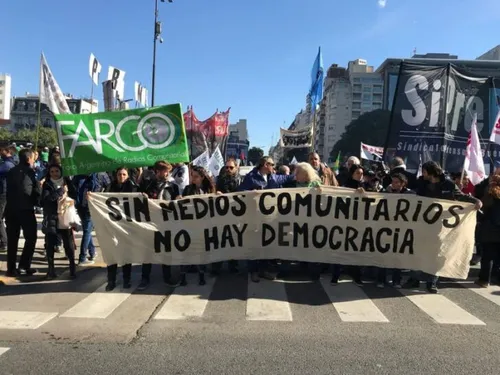
Several organizations and unions linked to communication in Argentina presented a complaint to the Inter-American Court of Human Rights on Thursday (8) about President Javier Milei’s attacks on public and community communication in the country.
The document points out that communication and freedom of expression were affected by the intention of Javier Milei’s government to dismantle legal frameworks that protect rights that were in force in the country.
“In Javier Milei’s Argentina there is less and less popular representation in content, it is an attack on democracy, limiting the plurality of voices, freedom of expression and the supreme value that we need, which is the right to communication, are at stake”, says Mariano Randazzo, member of the Radio Sur collective, a community broadcaster in the city of Buenos Aires, one of the radio stations that are part of the coordination of the Association of Community Radios (Amarc) Argentina.
In addition to Amarc, the document is signed by the Center for Legal and Social Studies, the National Coordination of Alternative Television, the Argentine Community Radio Forum, as well as federations and unions of press and social communication workers.
The text sent to the IACHR also draws attention to the growing violence directed at press professionals amid protests against Milei’s ultraliberal policies. The most recent case was during the processing of the ultraliberal package known as the Bus Law, which went back to square one in the National Congress, in the government’s first parliamentary defeat caused by the government deputies themselves.
“There were many demonstrations and an absurd number of police and other forces acting to repress. and the targets of the attacks were mainly journalists, communicators, photographers and communications workers,” he reported to Brazil in fact Argentine journalist and communicator Sofía Hammoe.
Milei’s attack on the public and community communication system in Argentina takes place on several fronts, through decrees, laws and direct interventions by the Executive in public companies and supervisory bodies.
:: How can the debate on reforms in Argentina wear down Milei’s government? ::
“Since the campaign, he has been threatening these measures and, this year, the government has indicated an intervention both in public media and in Enacom [ Ente Nacional das Comunicações]. Something is happening that we already experienced when the Macri government took over in 2015, there are so many fronts that are trying to achieve rights, that it is difficult to keep track of everything”, points out Hammoe.
Milei appointed intervenors for the country’s public communications companies: the Télam news agency and the RTA system – public radio and television and national educational TVs. Enacon, the regulatory body for the radio broadcasting and telecommunications system, was also the target of direct intervention by of the president, through Decree 89/24. Milei also threatens to close the Public Defender’s Office for Audiovisual Communication Services – responsible for defending and promoting the Argentine public’s right to communication.
“He decided to interfere in an authoritarian manner, arguing that the public media were propaganda bodies at the service of a government and, therefore, he left them under the absolute control of his own government”, points out Randazzo.
The participation and control mechanisms of these public companies were annulled in Congress by the governing party A Liberdade Avança, eliminating the participation provided for parliamentary minorities and for the social representation of the RTA established by Law 26,522, popularly known as the Means Law.
“In the case of the RTA, which had representation for the first, second and third parliamentary minorities, the intervener takes over the three directories”, points out Jéssica Triten, General Manager of Public Content Society of the State, responsible for educational TV.
Attacks on the Media Law
In 2009, Argentina approved Law 26,552, popularly known as the Media Law, with the aim of democratizing legal standards in the country’s audiovisual and telecommunications sectors. Despite strong resistance from the country’s business sector, the law was ratified by the Supreme Court of Justice in 2013.
“It was a historic feat for our country. On the one hand, because it is a law created by organizations, by the demands of different sectors, publicly debated throughout the country and which replaced the regulatory framework in force since the last civic-military dictatorship”, points out Randazzo.
Among a series of measures, the law establishes limits on the concentration of ownership of audiovisual media in the country. These limits were eliminated through Decree of Necessity and Urgency (DNU) 70/23, “enabling levels of media concentration that are incompatible with the IACHR’s standards of freedom of expression”, says the text delivered to the IACHR.
Milei also expressed her intention to eliminate the Competitive Development Fund for Audiovisual Communication Media (Fomeca) established by the Media Law as an equality mechanism for non-commercial media, largely used by community radio stations, which include rural workers and indigenous peoples.
“The people who are taking over the government together with Milei are ignorant of public service, they talk about things they don’t know. These resources like Fomeca are not generated by the State, they come from a series of taxes and fees that come from private audiovisual communication, collected through advertising, and have no cost to the State”, points out Sofía Hammoe.
Bus Law
Another front of Milei’s attack on these bodies is embedded in the ultraliberal package, known as the Bus Law, presented to the National Congress, with proposals to convert State companies into joint-stock companies and privatize public communication vehicles with national reach, such as the agency news channel Télam and Rádio Nacional. Although its progress in Congress has been reversed, the measures provided for in the Bus Law remain in the Argentine government’s reform plan.
Editing: Rodrigo Durão Coelho
Source: www.brasildefato.com.br

